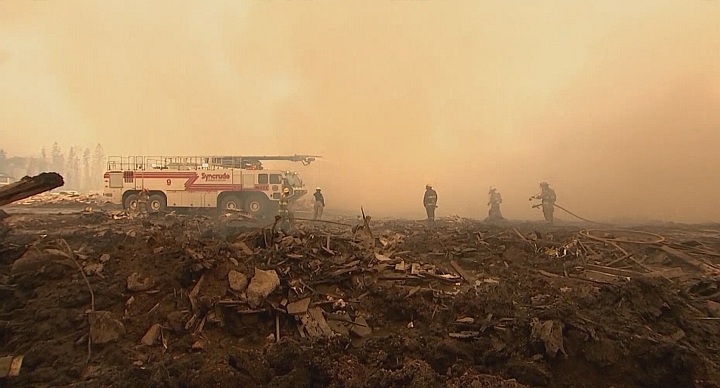Canada’s climate is getting hotter and wetter and it may have an impact on your mental health.

That’s what experts are warning as Canada’s climate continues to shift dramatically, causing severe flooding in many parts of the country, and even droughts and fires in parts of the Prairies and the West Coast.
READ MORE: American storm chasers in Alberta ahead of ‘potential outbreak of tornadic supercells’
It’s extreme weather events like those experienced in the 2016 wildfires in Fort McMurray and the 2013 floods in Toronto that can trigger mental-health disorders such as anxiety and depression, as well as post-traumatic stress disorder (PTSD).
Over the last 50 years alone, Canada’s average temperature has increased by 1.3 degrees Celsius, the Ontario College of Family Physicians (OCFP) says in a report on health and climate change in Canada — that’s twice the global average rate of warming.
And while some may believe these events are few and far between, they are actually becoming more frequent, and will continue to grow in frequency every year, Environment Canada says.
Not only can extreme weather events bring on new mental-health issues, but they can also exacerbate existing conditions by triggering symptoms, not to mention disrupt the medical care of patients, says Dr. Georgia Pomaki, leader of mental-health specialists at Group Disability Benefits at Manulife.
But when it comes to depression and anxiety, Pomaki says those symptoms can often be a result of the loss one experiences during these events: loss of their job, financial security, relationships and/or their belongings.

Get weekly health news
And anxiety is not a feeling one only experiences during the event itself, but before and afterwards as well, Robert Gifford, professor of psychology at the University of Victoria adds.
This is especially true for people who live in regions where extreme weather events are known to happen like flood and wildfire regions, Pomaki says.
The financial fallout following an event can also take its toll. According to the University of Waterloo’s Intact Centre on Climate Adaptation and Manulife and Intact Financial Corporation, the average cost of a flooded basement in Canada is $43,000.
READ MORE: #OpenYourPurse movement for mental health honours Kate Spade
But when it comes to taking preventative measures, only 29 per cent of Canadians say they are taking actions to protect their home from flooding, the University of Waterloo reports. And only six per cent are aware that their house is located in a flooding region.
And an event doesn’t only have to be considered “big” to have an impact either. A “smaller” weather event too also has the power to leave its mark.
By taking pre-emptive measures, however, Pomaki says it can alleviate much of the stress and anxiety, and may help manage symptoms of other mental-health disorders. This can include having a savings set aside for possible future events, investing in renovations to your home and/or having a plan in place should something happen.
Those who are more likely to experience the effects of climate change are those who live in forested areas, live at water’s edge and whose livelihood or recreation is affected by rapid or slow changes in plants and animals most important to them, Gifford explains. City dwellers who live on low-lying land (like Richmond, B.C. for example) are also more likely to feel the effects as well.
“Ultimately, we will all be affected through increased civil conflict over immigration — people escaping even worse scenarios and physical health disease vectors moving north,” Gifford says.











Comments